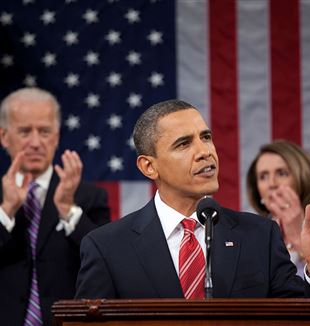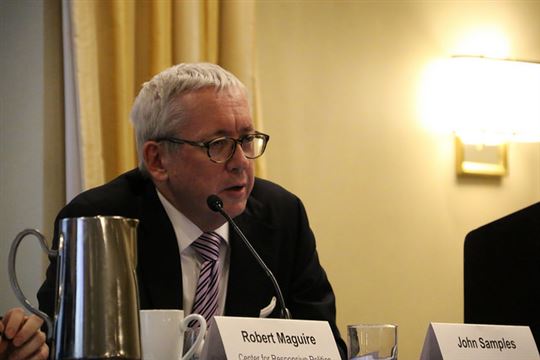
Questioning Polarized American Politics
The November election results once again invite Americans to ask themselves, “What happened… and where are we going?” John Samples, prominent DC think-tank director, author, and professor addresses the issues head-on.The November election results once again invite Americans to ask themselves, “What happened… and where are we going?”The hard look required must go beyond polemics to the needs and desires at the heart of the people to surmount entrenched prejudices and power plays. JOHN SAMPLES, prominent DC think-tank director, author, and professor addresses the issues head-on.
In the recent midterm elections, Republicans scored the largest party turnover in 70 years, now controlling the House of Representatives. While a diminished Democratic majority still controls the Senate, a new flock of lawmakers leaning toward downsizing government has been ushered in. But the meaning of these results is contested in the polarized atmosphere–even within parties–of today’s U.S. politics. Some Democrats suggest that President Obama went too far, over-reaching his mandate. Other Democrats assert that he did not go far enough, arguing he should have been more forceful in pushing a progressive agenda. Still others in his party congratulate all his efforts but feel the results of the elections speak to the fact that he should have done more to “sell” his accomplishments. The Republicans too are split on what the turnover means and what it will lead to–some boast of a refusal to compromise with the President, while others insist this is not the time to display a desire for power, but to cooperate in moving forward with the best interests of the people. To understand better what is in the balance, Traces met with political commentator and historian John Samples, Director of the Cato Institute's Center for Representative Government, which studies campaign finance regulation, delegation of legislative authority, term limits, and the political culture of limited government and the civic virtues necessary for liberty. He is an adjunct professor at Johns Hopkins University, and author of an important new book, The Struggle to Limit Government (a history of the growth of Big Government since the Progressive Era and the so-far mostly unsuccessful campaign by conservatives to restore limited government).
Generally speaking, what do you think this election says about what is in the hearts of the American people?
I guess I would say that there is no “American people” but there are groups of people. When an election is held, the most important question is: “Do you approve or disapprove of the political status quo?” President Obama and the Democratic majorities were the political status quo in 2010. A large part of the electorate said they did not approve of Obama and his allies in this election.
Do you think there can be a productive “dialogue” between parties in seeking not (only) compromise but that which is truly good for citizens?
The American constitutional design assumes that political struggle can lead to agreements that are the best approximation to the common good of the society. I still think that is possible, but people engaged in politics are quite polarized. They often fail to see the legitimacy of the views of those who disagree with them.
How much do you believe this government can do to address major difficulties our nation faces, such as the recession, unemployment rates, health care?
This is the central question of American politics right now. Personally, I doubt that the government can do much to counter the recession or unemployment. The economy experienced a strong financial shock in 2008. Studies across nations indicate such shocks take some time to get over. The government is deeply involved in the provision of health care, but there is little evidence that the United States government can provide broad coverage at a cost near what other nations pay. The political system seems incapable of reaching those twin goals.
If government cannot "solve" these problems, where can we hope for change?
On fiscal questions, I must say, I have become quite pessimistic in the last few years. I believe the United States will have to experience a severe fiscal crisis before the necessary changes are made. In general, I would say that Americans have to change. Too many people have come to believe–and are encouraged to believe–that they bear no responsibility for their own lives and their families. For example, many people who faced foreclosure on houses that they had unwisely bought said that the government should prevent banks from taking possession of their houses. People should not be held perfectly responsible for all that happens to them. But government and society become impossible when only a few take such responsibility. More generally, I think that Americans need to recognize that political liberty is possible only if citizens have internal constraints. The culture has done much to destroy such constraints in the past few decades. The result has been a larger government which deals with the consequences of such cultural failure.
You are known to be a supporter of faith in the public square. Why is this?
First, the original meaning of the United States Constitution indicates a right to the free exercise of religion. That right does not end at the edge of what might be called the public sphere. Second, I think democracy requires citizens who have some internal constraints on their conduct and a sense of the good of the whole. As Alexis de Tocqueville recognized long ago, religion in America forms citizens who are capable of making a democracy work.
What in our history has caused this right to be subjugated?
Most societies comprise people who are ambitious. In other words, they wish to gain political power because they highly value controlling others. Ambition requires an expanding government. Religion can be a powerful limit on political power. Politicians naturally seek to remove limits on their ambition. Scientism has also been an important factor. If science is the only valuable guide to human life, other guides–like religion–are said to be merely subjective or superstitious. Finally, some see in politics or political engagement a substitute for religion. Politics offers a heaven on earth. President Obama embodies all these tendencies. People “cling” to their religion when the economy goes bad. Obama offers himself as a secular saint to replace the older faiths. Many people are willing to worship the new religion, as we saw on Obama’s Inauguration Day.
Do you think that the definition of “freedom” has changed over time?
The idea that liberty was demanding has largely disappeared. Freedom is now taken to mean “doing as I please,” quite apart from the consequences for anyone else.
What do you think of the maxim, “more society, less government”?
I like the slogan. It suggests that society can replace government for many purposes. I do believe that people who are skeptical of government should put more emphasis on what society can do without government action. The question remains whether “society” or “Big Society” might become another way of talking about government programs and policies. That would be a mistake.
What direction are we moving in today–based on the peoples’ choices–regarding a republic (that relies on a representative government, as favored by the Founding Fathers) or a pure majority rule democracy?
We have majority rule in informal ways. The views of a majority as determined by surveys are influential on day-to-day politics. Moreover, there is great distrust of representatives, in part for good reason. Still, the U.S. Congress and presidency can resist majority preferences if necessary. However, the examples of such resistance–the health care bill and the 2008 bailouts–are not reassuring. The monetary authorities–the Federal Reserve–are also indirectly responsive at most to majorities. We are certainly more of a majority rule democracy than in 1789 or 1960. But I do not see us becoming a pure democracy in the near future.
It seems that the power of ideology, across party lines, is sometimes stronger than man’s quest for the truth…
In America, I see politics as a pragmatic matter now. We can hope that politics provides the conditions for individuals, families, and communities to live good lives and to seek the truth. Political ideology undermines that hope. It insists on the centrality of politics to all of life.
Do you agree with the premise that freedom of education is key for such a quest?
Yes, I do. I have spent my life trying to educate others and myself. However much I have come to see the dangers of the Enlightened in politics, I still hold education to be central to a life well-lived.
How do you think the results of November’s elections might serve the desires of those wishing to freely educate their children, in terms of general policy as well as, for example, subsidiarity initiatives?
To be blunt, the liberal wing of the Democratic Party in the United States will not allow parents to freely educate their children and wishes to centralize political power in Washington. That wing of the party lost badly in 2010. So we can see an opening for something different in the years to come. But that “something different” that you mention is far from realization. It is a possibility once again, and that is a reason for hope.